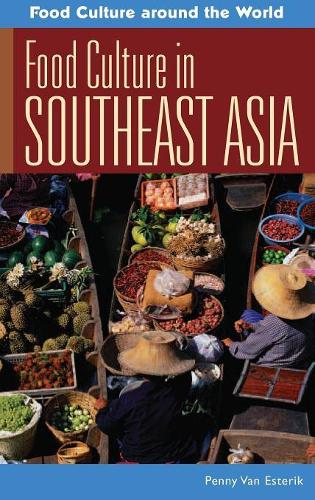
Food Culture in Southeast Asia
(Hardback)
Publishing Details
Food Culture in Southeast Asia
By (Author) Penny Van Esterik
Bloomsbury Publishing PLC
Greenwood Press
30th August 2008
United States
Classifications
General
Non Fiction
Sociology
Cultural studies: customs and traditions
394.10959
Physical Properties
Hardback
176
Width 156mm, Height 235mm
397g
Description
Southeast Asian cuisines, such as Thai, have become quite popular in the United States even though immigrant numbers are low. The food is appealing because it is tasty, attractive, and generally healthful, with plentiful vegetables, fish, noodles, and rice. Food Culture in Southeast Asia is a richly informative overview of the food and foodways of the mainland countries including Burma, Thailand, Lao, Vietnam, Cambodia, and Malaysia, and the island countries of Singapore, Brunei, East Timor, Indonesia, and the Philippines. Students and other readers will learn how diverse peoples from diverse geographies feed themselves and the value they place on eating as a material, social, and symbolic act. Chapter 1, Historical Overview, surveys the archaeological and historical evidence concerning mainland Southeast Asia, with emphasis on the Indianized kingdoms of the mainland and the influence of the spice trade on subsequent European colonization. Chapter 2, Major Foods and Ingredients, particularly illuminates the rice culture as the central source of calories and a dominant cultural symbol of feminine nurture plus fish and fermented fish products, local fresh vegetables and herbs, and meat in variable amounts. The Cooking chapter discusses the division of labor in the kitchen, kitchens and their equipment, and the steps in acquiring, processing and preparing food. The Typical Meals chapter approaches typical meals by describing some common meal elements, meal format, and the timing of meals. Typical meals are presented as variations on a common theme, with particular attention to contrasts such as rural-urban and palace-village. Iconic meals and dishes that carry special meaning as markers of ethnic or national identity are also covered. Chapter 6, Eating Out, reviews some of the options for public eating away from home in the region, including the newly developed popularity of Southeast Asian restaurants overseas. The chapter has an urban, middle-class bias, as those are the people who are eating out on a regular basis. The Special Occasions chapter examines ritual events such as feeding the spirits of rice and the ancestors, Buddhist and Muslim rituals involving food, rites of passage, and universal celebrations around the coming of the New Year. The final chapter on diet and health looks at some of the ideologies underlying the relation between food and disease, particularly the humoral system, and then considers the nutritional challenges related to recent changes in local food systems, including food safety.
Reviews
Van Esterik's contribution demonstrates her in-depth knowledge of the culture and foodways of much of Southeast Asia. Her willingness to complicate the matters of colonialism and national or ethnic identityas well as the impact of globalization on worldwide foodscapeshas raised the bar, I believe, on the academic value that be found in the books in Greenwood's Food Culture around the World Series. * Southeast Review of Asian Studies *
There are good things here, including Van Esterik's discussion of kitchens as 'ritually important places in traditional Southeast Asian houses' . . . which reminds us that who is cooking and where can be as important as what is on the stove. * Gastronomica *
Author Bio
Penny Van Esterik is Professor of Anthropology at York University and has specialized in Southeast Asia. She is a noted expert on food and nutrition in the region and has authored and edited a number of works, including Food and Culture: A Reader (1997).
